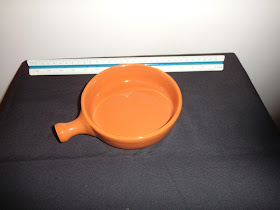Designer
|
Homage to June Dyson ramekin from 1960s
|
Maker
|
Robert Gordon
|
Marks
|
Stamped “Cutie Pies Robert
Gordon Australia made in china” in black ink to base.
|
Material
|
Glazed slip
|
Description
|
Gloss glazed slip in pale
pastel colours. Mould formed with
flat handle moulded to top of rim, splayed at end. Unglazed foot ring.
|
Condition
|
Very good
|
Number
|
No number
|
Production Date
|
1990s
|
Width at rim
|
110mm
|
Width at Base
|
65mm
|
Depth
|
65mm
|
Length (with handle)
|
140mm
|
Weight
|
280gm
|
Volume
|
300ml
|
Acquisition
|
Purchase
Waverly Antiques
24 October 2014
|
Rameking Reference Number
|
RGP 001 to 004
|
Just like mother used to make. That is
what you could say about these ramekins.
Similar in design to earlier June Dyson ramekins. The “Cutie Pies” range is no longer made,
but these examples survive. These
ramekins are stamped “made in china” as part of the base. The full stamp says “Cutie Pies Robert
Gordon Australia made in china”.
Earlier works made in Gembrook at the Pack Track Pottery are hand
painted with “Robert Gordon” or just, “Gordon” in oxide. Wares made at the
Robert Gordon Pottery in Pakenham are stamped 'Robert Gordon Pottery
Australia', 'Robert Gordon Pottery Australian Made' or 'Robert Gordon
Australia'. But the story and inspiration for Robert Gordon dates long
before.
Andy’s mother, the renowned
Australian potter June Dyson, first set up her studios in 1945. June formed a
partnership with her husband Colin who became the company’s business director.
And it was June’s second son Robert Andrew “Andy” Gordon, who showed most
interest in the pottery, helping out in the studios from his early
twenties. It was inevitable that Andy would one day follow in his mother’s
footsteps. And having married his English wife Barbara, the couple set about
building their dream.
June Dyson Ramekins from the 1950s or 60s.
Over thirty years ago, in 1979,
‘Andy’ walked into a ten by eight foot tin shed in Gembrook, a small town in
the Dandenong Ranges outside Melbourne, picked up a lump of clay and turned his
potters wheel. The “Pack Track Pottery” was born. Production was transported to
St Kilda Sunday market and other locations around Melbourne. Sales increased and larger premises were
needed.
One of Robert Gordon early unglazed earthenware ramekins
By 1987 the company had outgrown the tin shed and needed to expand. Two factories in Pakenham were bought and Robert Gordon had grown from a tin shed with a dirt floor to a large purpose built headquarters. It was also the time to bring new staff into the business. Andy and Barbara didn’t have to look far, their four children Hannah, Kate, Bobby and Sam all joined the business. History had repeated with a third generation in pottery. Eventually up to 100 people were employed, but cheaper imports caused the business to suffer and contract to one location. Now their children are an integral part of the company. Each one plays a different and vital role, helping to shape Robert Gordon today. More than sixty years of heritage and three generations of potters. Robert Gordon. Proud of its past, its future fired with imagination.
Robert Gordon is one of the last remaining production
potteries in Australia, responsible for over 150,000 individual products per
year (think tableware, kitchenware and other high-end ceramic homewares).
In addition to this impressive output, in recent years the business has
diversified, and now imports selected product from all over the world to
complement their core range of locally manufactured product. From their
headquarters and factory in Pakenham, Robert Gordon now employs around 40
people, stocks over 3000 independent retailers in Australia, the U.S.A, Canada,
U.K and New Zealand.
Around 4 tonnes of clay is used each week. The clay is sourced in New South Wales,
milled at Clayworks in Dandenong Victoria.
Clayworks produces a wide range of earthenware and porcelain clays. The milled clay is then shipped to
Pakenham. Their hollow ware is slip
cast and their flatware is ram-pressed by machine. Some products are still hand thrown.




